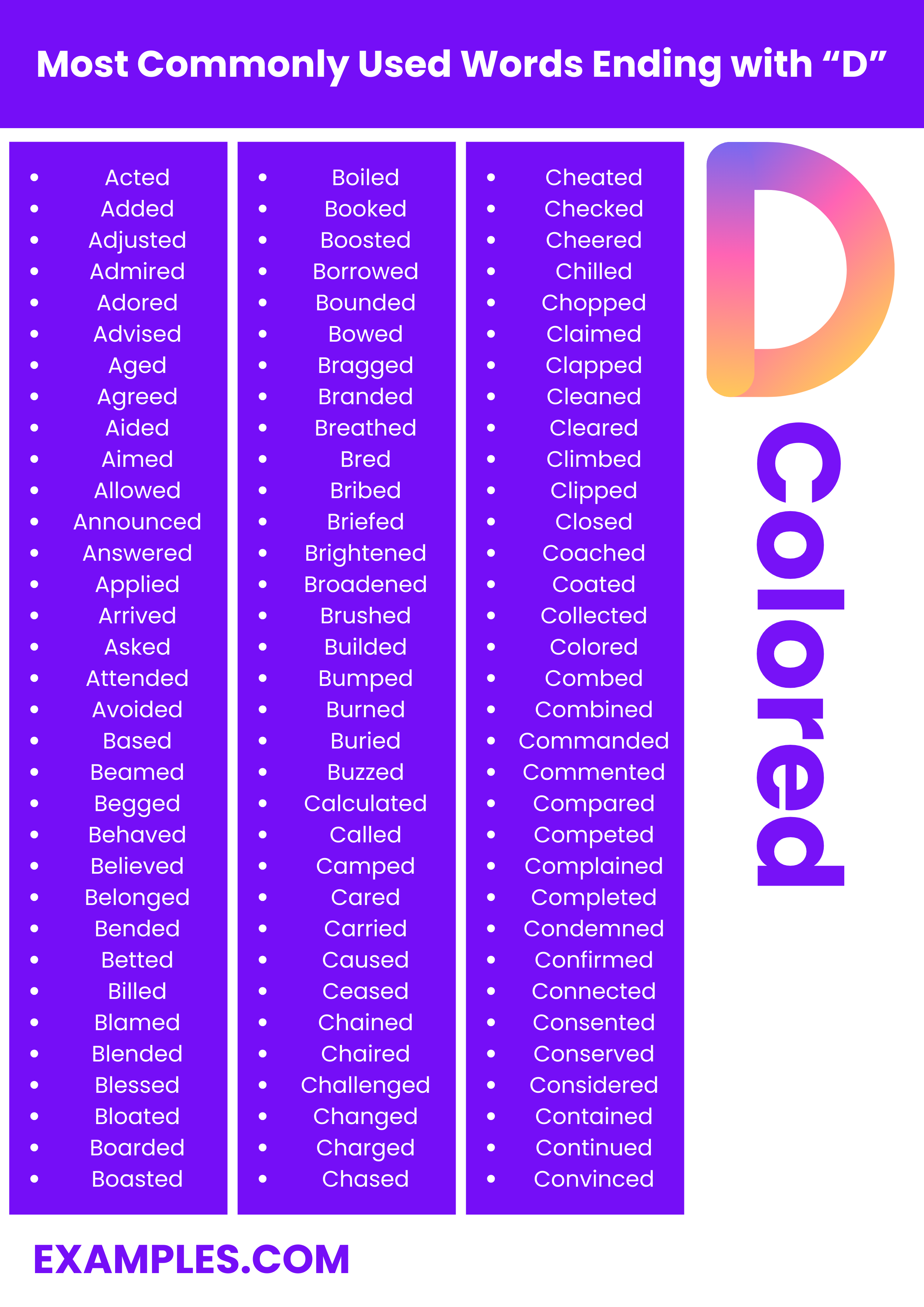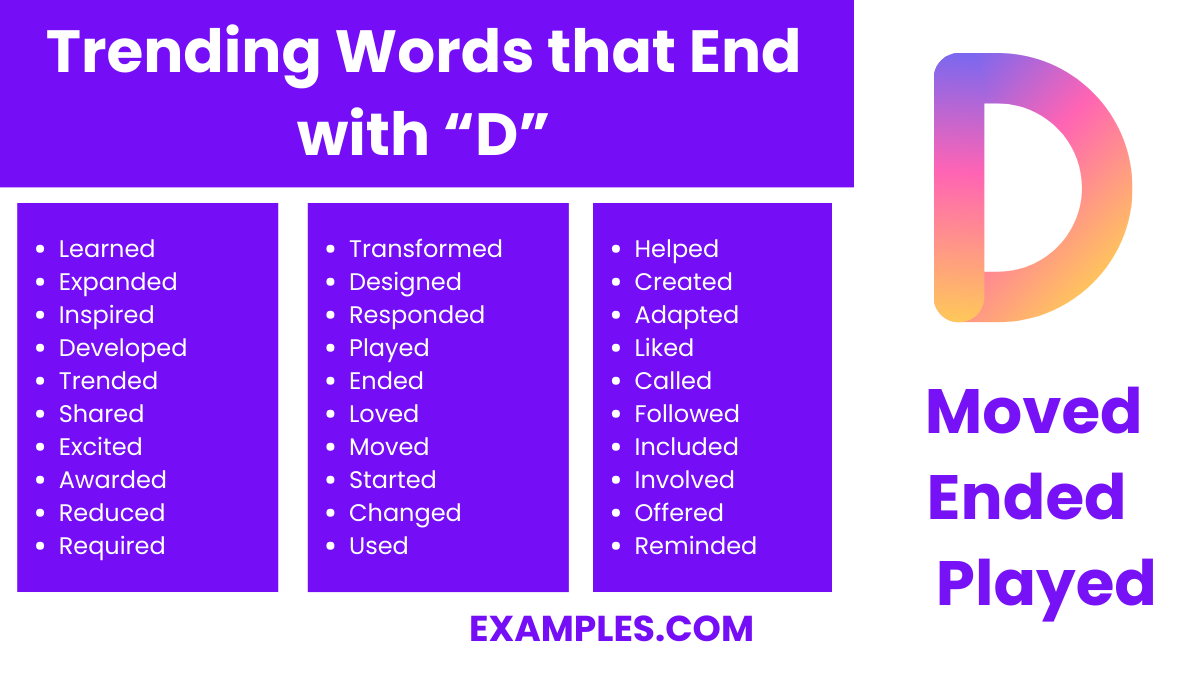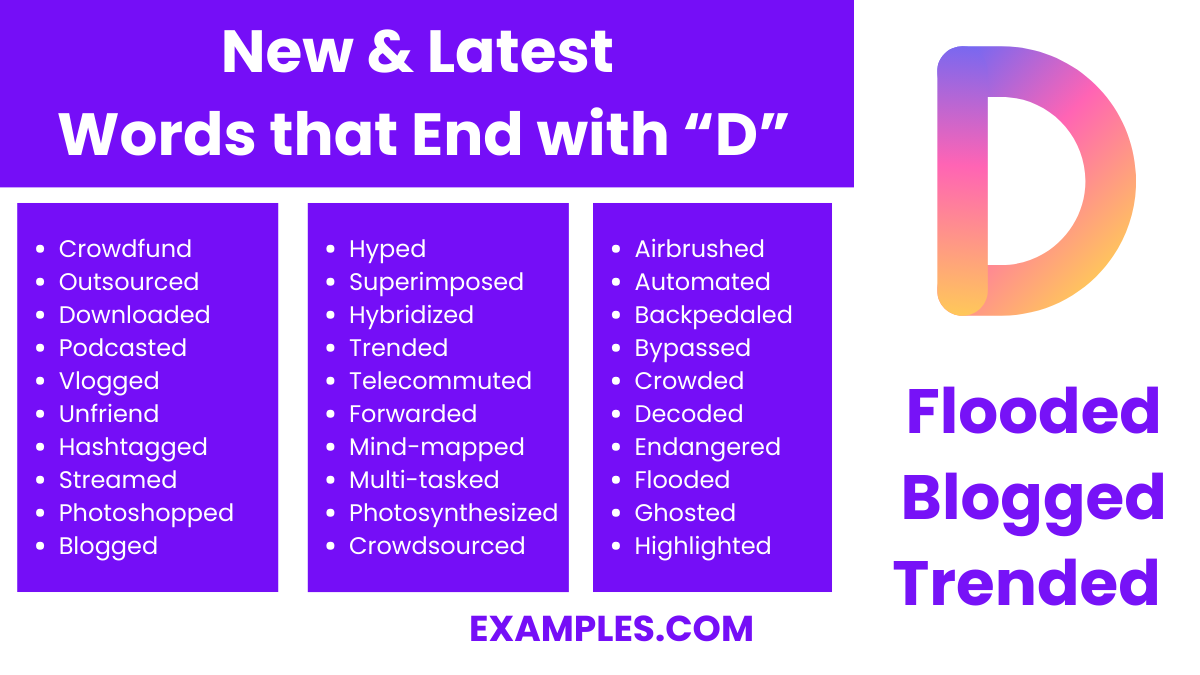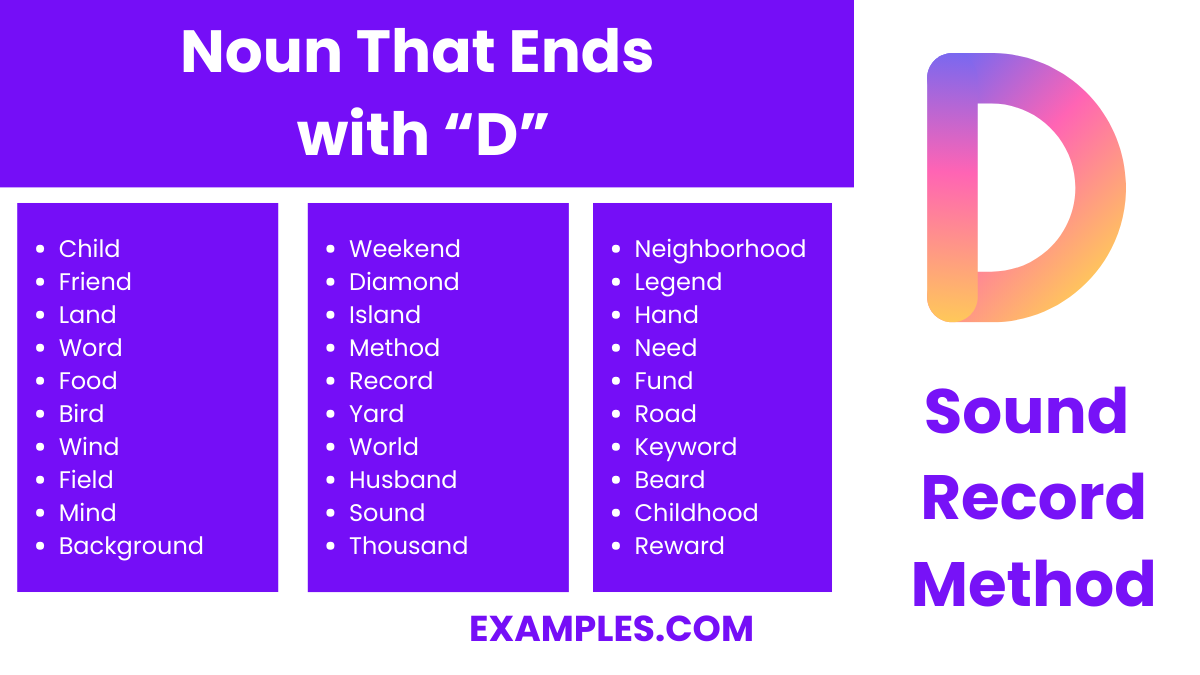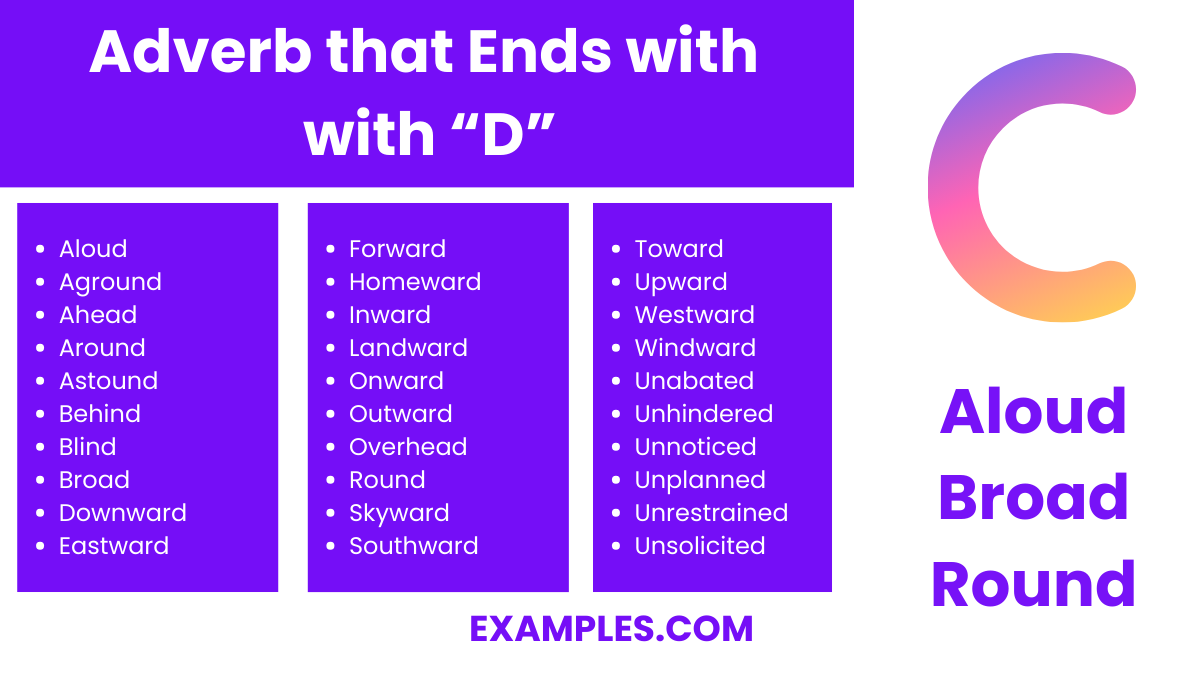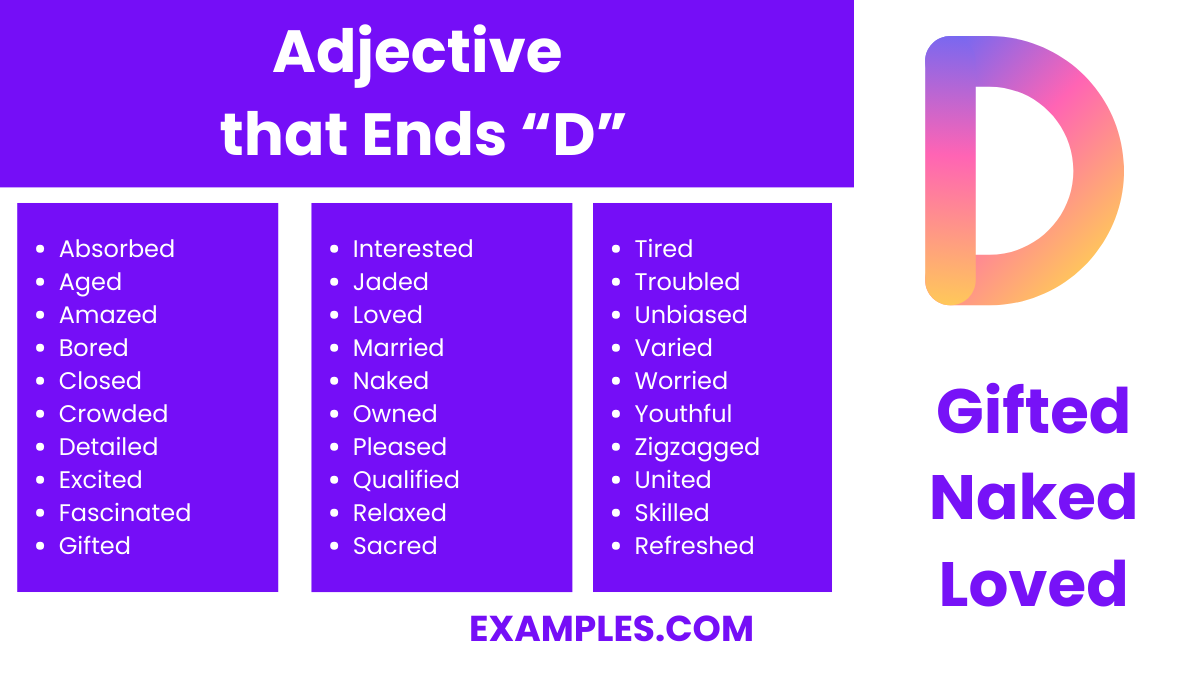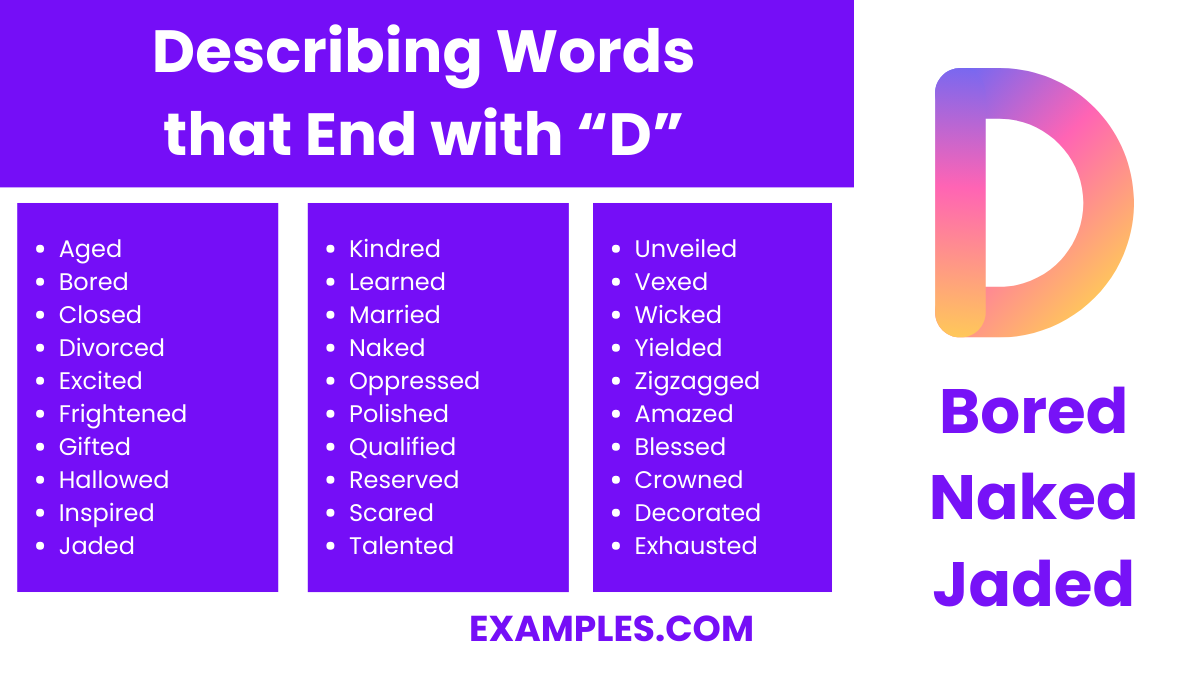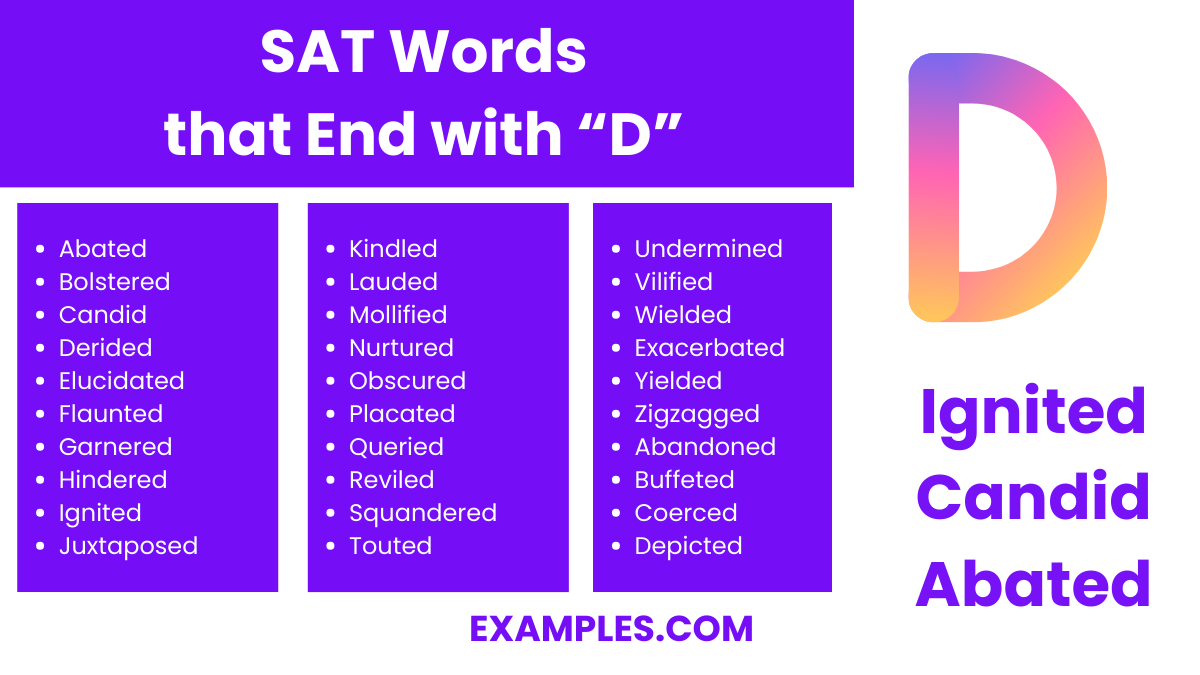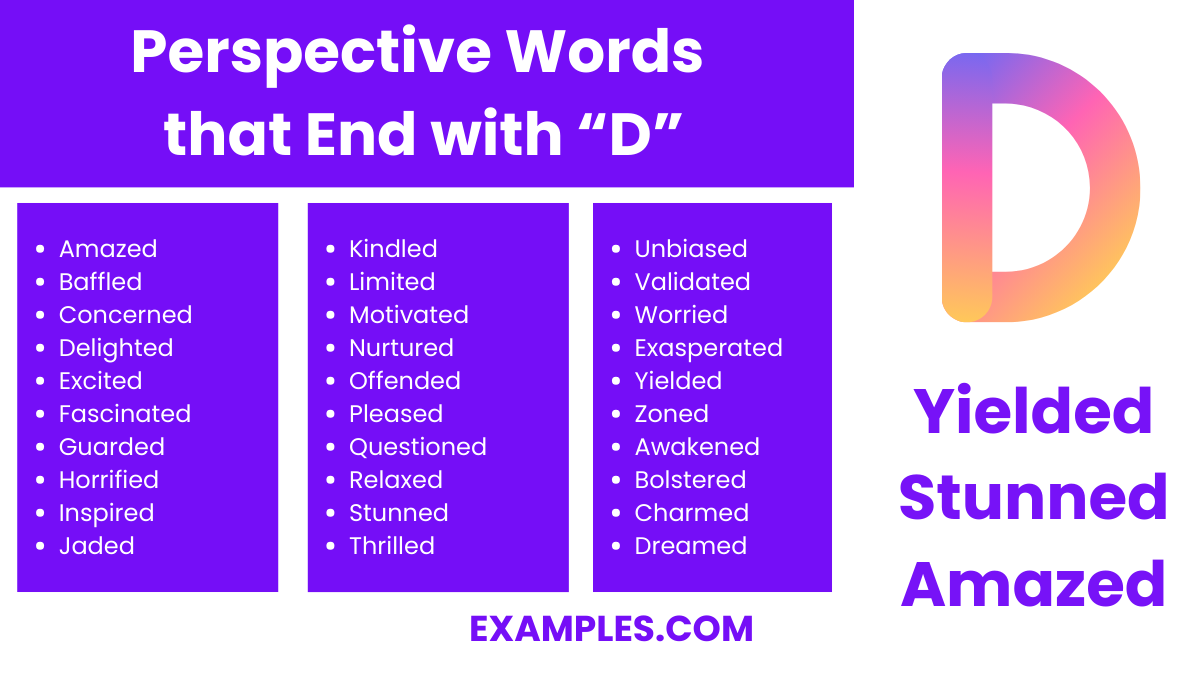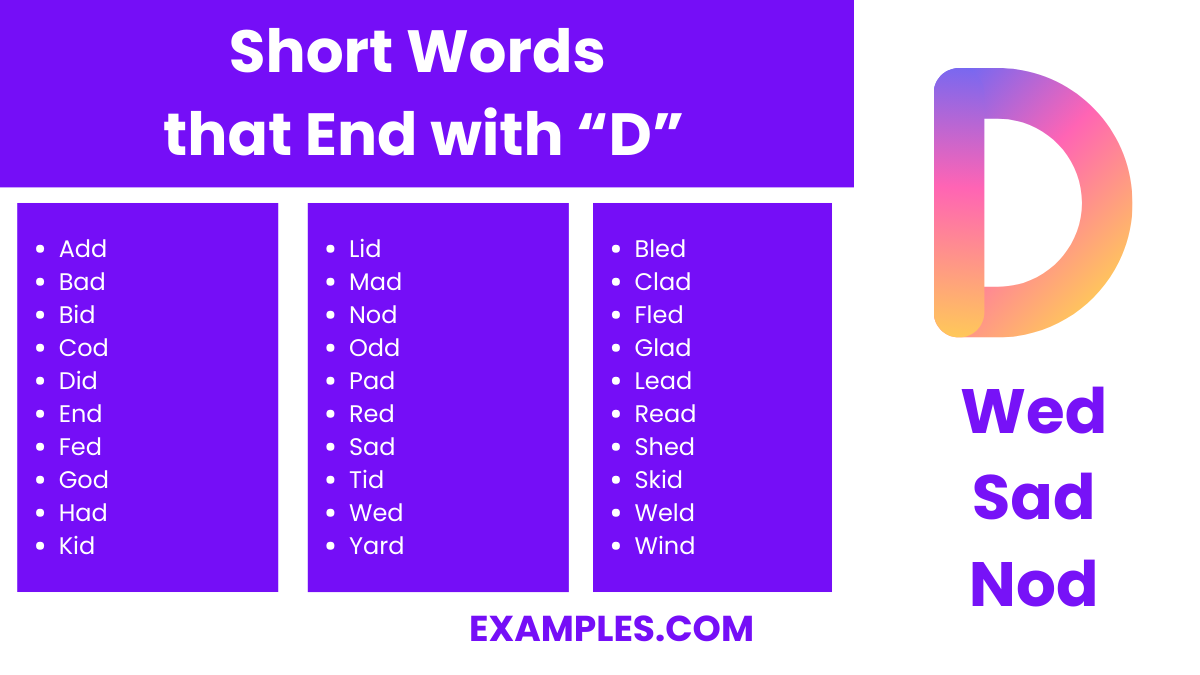150+ Words Ending with D List, Meaning, PDF
Words ending with ‘D’ is a fascinating journey in the English language, offering a rich tapestry of vocabulary for both teachers and students. This guide aims to equip educators with effective strategies to teach these words, enhancing students’ communication skills. From verbs in their past tense form to descriptive adjectives, the ‘D’ Words ending is versatile and prevalent. Our tips and examples are curated to encourage a deeper understanding and usage, making language learning an engaging and comprehensive experience. Dive in to discover the diversity and utility of words ending in ‘D’.
Download Most Commonly Used Words Ending with D - PDF
| 5 Letter Words With D | 6 Letter Words with D | 7 Letter Words With D |
| 8 Letter words with D | 9 Letter Words With D | 10 Letter Words With D |
| Words With Letter D in Middle | D Silent Words | ED Words |
150 Most Commonly Used Words Ending with “D”
Words ending with the letter ‘D’ are incredibly versatile and play a significant role in the English language. This collection of 150 commonly used words is a valuable resource for teachers aiming to enhance their students’ vocabulary and comprehension skills. The following table, organized in a user-friendly format with 6 columns, ensures ease of access and learning. Each word in this list is unique, providing a wide range of vocabulary for students to learn and apply in various contexts, from creative writing to everyday communication. Understanding and using these words can greatly assist in the development of students’ language skills, helping them to express themselves more clearly and effectively.
| Acted | Added | Adjusted | Admired | Adored | Advised |
| Aged | Agreed | Aided | Aimed | Allowed | Announced |
| Answered | Applied | Arrived | Asked | Attended | Avoided |
| Based | Beamed | Begged | Behaved | Believed | Belonged |
| Bended | Betted | Billed | Blamed | Blended | Blessed |
| Bloated | Boarded | Boasted | Boiled | Booked | Boosted |
| Borrowed | Bounded | Bowed | Bragged | Branded | Breathed |
| Bred | Bribed | Briefed | Brightened | Broadened | Brushed |
| Builded | Bumped | Burned | Buried | Buzzed | Calculated |
| Called | Camped | Cared | Carried | Caused | Ceased |
| Chained | Chaired | Challenged | Changed | Charged | Chased |
| Cheated | Checked | Cheered | Chilled | Chopped | Claimed |
| Clapped | Cleaned | Cleared | Climbed | Clipped | Closed |
| Coached | Coated | Collected | Colored | Combed | Combined |
| Commanded | Commented | Compared | Competed | Complained | Completed |
| Condemned | Confirmed | Connected | Consented | Conserved | Considered |
| Contained | Continued | Convinced | Cooked | Cooled | Cooperated |
| Copied | Corrected | Counted | Covered | Cracked | Crafted |
| Crashed | Crawled | Created | Cried | Crossed | Crowded |
| Crushed | Cuddled | Curled | Curved | Cutted | Damaged |
| Danced | Dared | Dealt | Decided | Declared | Decorated |
| Delayed | Delighted | Delivered | Demanded | Demonstrated | Departed |
| Depended | Described | Desired | Destroyed | Detected | Developed |
| Devoted | Dialed | Dictated | Died | Differed | Digested |
| Directed | Disagreed | Disappeared | Discovered | Discussed | Disguised |
| Dismayed | Dispatched | Displayed | Disposed | Disturbed | Divided |
| Divorced | Donated | Doubled | Drafted | Drained | Dreamed |
| Dressed | Dried | Dropped | Drowned | Drummed | Earned |
| Echoed | Edited | Educated | Ejected | Elected | Embraced |
| Ended | Enjoyed | Entered | Equipped | Escaped | Estimated |
Most Trending Words that End with “D”
In the vibrant sphere of English language education, staying abreast of the latest trending words, particularly those terminating with ‘D’, is crucial. This compilation not only broadens students’ lexicons but also syncs them with current linguistic trends. Delving into words ending in ‘D’ unveils a distinctive perspective on language’s progression, with many words serving as past-tense verbs or descriptive adjectives, essential for crafting expressive and impactful narratives. For educators, this assemblage is an indispensable resource to acquaint students with terms prevalent in contemporary literature, media, and scholarly content. Incorporating these words into pedagogical strategies and exercises, including Rhyming Words to enhance phonetic awareness and Daily Use English Words for practical application, empowers teachers to offer a more stimulating and pertinent educational journey, thereby fostering adept communicators well-versed in the nuances of modern English.
- Learned – Having acquired much knowledge through study.
- Expanded – Increased in size or volume.
- Inspired – Filled with the urge to do something creative.
- Developed – Grown or caused to grow and become more mature.
- Trended – Became very popular or fashionable.
- Shared – Divided and distributed.
- Excited – Very enthusiastic and eager.
- Awarded – Given something as a prize or reward.
- Reduced – Made smaller or less in amount.
- Required – Needed; essential.
- Transformed – Made a thorough or dramatic change.
- Designed – Planned and fashioned artistically or skillfully.
- Responded – Said something in reply.
- Played – Engaged in an activity for enjoyment.
- Ended – Brought to a conclusion.
- Loved – Felt deep affection for.
- Moved – Changed position.
- Started – Began an action or event.
- Changed – Made or become different.
- Used – Employed for a purpose.
- Helped – Gave assistance to.
- Created – Brought something into existence.
- Adapted – Made suitable for a new use or purpose.
- Liked – Found agreeable, enjoyable, or satisfactory.
- Called – Gave a name to.
- Followed – Went or came after.
- Included – Comprised or contained as part of a whole.
- Involved – Connected or concerned with something.
- Offered – Presented for acceptance or rejection.
- Reminded – Caused to remember.
New & Latest Added Words that End with “D”
In the dynamic realm of English vocabulary, keeping pace with the latest linguistic innovations is paramount. This segment shines a spotlight on the freshest and most buzzworthy words ending with ‘D’, marking their entry into the English lexicon. These novel terms open a portal to contemporary language dynamics, mirroring the pulse of current societal movements, technological leaps, and cultural transformations. For educators, weaving these words into the educational fabric not only equips students with a linguistically current arsenal but also primes them for real-world engagements. This linguistic refreshment, embracing both singular & plural words for grammatical fluency and festive Christmas Words for seasonal relevance, not only bolsters communicative prowess but also instills linguistic confidence in students. It empowers them to navigate complex narratives and articulate nuanced sentiments with ease, enriching their engagement with the evolving tapestry of the English language.
- Crowdfund – To fund a project or venture by raising money from a large number of people.
- Outsourced – Obtained goods or services from an outside supplier.
- Downloaded – Transferred data from one computer system to another.
- Podcasted – Distributed multimedia digital file available for download.
- Vlogged – Posted content in a video blog.
- Unfriend – Remove someone from a list of friends or contacts on a social networking site.
- Hashtagged – Marked a keyword or topic on social media with a hash sign.
- Streamed – Transmitted or received data over the internet as a steady, continuous flow.
- Photoshopped – Edited an image using the Photoshop software.
- Blogged – Added a new entry to a blog.
- Hyped – Created publicity for something, often exaggerating its importance.
- Superimposed – Placed or laid something over another.
- Hybridized – Crossbred different species or varieties.
- Trended – Become very popular or fashionable.
- Telecommuted – Worked from home, making use of the internet.
- Forwarded – Sent a letter or email on to a further destination.
- Mind-mapped – Laid out ideas visually in a structured diagram.
- Multi-tasked – Carried out more than one task at the same time.
- Photosynthesized – Converted sunlight into energy in plants.
- Crowdsourced – Obtained input or contributions from a large group of people.
- Airbrushed – Used an airbrush to paint or modify photos.
- Automated – Converted a process to operate automatically.
- Backpedaled – Reversed one’s previous action or opinion.
- Bypassed – Avoided or found a way around an obstacle.
- Crowded – Filled a space with too many people or things.
- Decoded – Converted code into understandable language.
- Endangered – Put someone or something at risk or in danger.
- Flooded – Overwhelmed with a large number or amount.
- Ghosted – Ended a personal relationship by suddenly ceasing communication.
- Highlighted – Emphasized or made more noticeable.
Noun That Ends with “D”
In the realm of English language education, emphasizing specific word endings can greatly aid both educators and students. Nouns ending with ‘D’ offer a distinctive set of terms that can significantly expand a learner’s vocabulary, encompassing a variety of objects, places, or concepts pivotal to daily communication and literary exploration. Introducing these nouns into educational content allows teachers to equip students with a more extensive lexical range, thereby enhancing their expressive capabilities and text comprehension. This compilation of nouns ending in ‘D’, carefully selected for linguistic richness and contemporary relevance, includes Compound Words to demonstrate complex word formations and Consonant Words to highlight phonetic diversity. Each entry is defined succinctly to facilitate ease of understanding and memory retention, making this list an invaluable resource for fostering advanced language skills and deeper engagement with the intricacies of English.
- Child – A young human being below the age of puberty.
- Friend – A person whom one knows and has a bond of mutual affection.
- Land – The part of the earth’s surface that is not covered by water.
- Word – A single distinct meaningful element of speech or writing.
- Food – Any nutritious substance that people eat or drink to maintain life and growth.
- Bird – A warm-blooded egg-laying vertebrate distinguished by feathers.
- Wind – The perceptible natural movement of the air.
- Field – An area of open land, especially one planted with crops or pasture.
- Mind – The element of a person that enables them to be aware of the world.
- Background – The part of a scene or picture that is farthest from the viewer.
- Weekend – The period from Friday evening through Sunday evening.
- Diamond – A precious stone consisting of a clear and typically colorless crystalline form of pure carbon.
- Island – A piece of land surrounded by water.
- Method – A particular procedure for accomplishing or approaching something.
- Record – A thing constituting a piece of evidence about the past.
- Yard – A unit of linear measure equal to 3 feet.
- World – The earth, together with all of its countries, peoples, and natural features.
- Husband – A married man considered in relation to his spouse.
- Sound – Vibrations that travel through the air or another medium and can be heard.
- Thousand – The number equivalent to the product of a hundred and ten.
- Neighborhood – A district or community within a town or city.
- Legend – A traditional story sometimes popularly regarded as historical but unauthenticated.
- Hand – The end part of a person’s arm beyond the wrist.
- Need – A requirement for something because it is essential or very important.
- Fund – A sum of money saved or made available for a particular purpose.
- Road – A wide way leading from one place to another, especially one with a specially prepared surface.
- Keyword – A word which acts as the key to a cipher or code.
- Beard – A growth of hair on the chin and lower cheeks of a man’s face.
- Childhood – The period of being a child.
- Reward – A thing given in recognition of service, effort, or achievement.
Adverb that Ends with “D”
Expanding students’ understanding of adverbs, especially those ending in ‘d’, can greatly enhance their grammatical precision and fluency in English. Adverbs Words ending in ‘d’ are unique and often overlooked, yet they play a significant role in sentence construction, adding depth and clarity to the language. These adverbs can describe how, when, where, and to what extent an action occurs, making them crucial for nuanced expression. By incorporating these words into lessons, teachers can provide students with the tools to express themselves more accurately and vividly. This list of 30 adverbs ending in ‘d’ is not only a valuable teaching resource but also a means to inspire students to explore the richness of English language and improve their communicative skills.
- Aloud – Audibly; not silently or in a whisper.
- Aground – With the bottom touching the ground, used especially of a vessel.
- Ahead – In or toward the front.
- Around – Located or situated on every side.
- Astound – To surprise or shock someone greatly.
- Behind – At the back of.
- Blind – Without seeing or without being aware.
- Broad – Widely; in a wide manner.
- Downward – Moving or tending down.
- Eastward – Toward the east.
- Forward – Towards the front; in the direction that one is facing or traveling.
- Homeward – Toward home.
- Inward – Toward the inside.
- Landward – Toward land.
- Onward – Moving forward or continuing a journey.
- Outward – Toward the outside.
- Overhead – Above the level of the head; in the sky.
- Round – From one side to the other in a circle; all around.
- Skyward – Toward the sky.
- Southward – Toward the south.
- Toward – In the direction of.
- Upward – Toward a higher place or position.
- Westward – Toward the west.
- Windward – In the direction from which the wind is coming.
- Unabated – Without any reduction in intensity or strength.
- Unhindered – Without being slowed or blocked.
- Unnoticed – Without being seen or noticed.
- Unplanned – Not planned or scheduled.
- Unrestrained – Not restrained or restricted.
- Unsolicited – Not asked for; given or done voluntarily.
Adjective That Ends with “D”
In the enriching journey of language learning, adjectives serve as crucial elements, infusing our sentences with color and precision, thereby elevating both written and spoken discourse. Delving into adjective words ending with ‘D’ unveils a realm of descriptive possibilities, offering students an array of nuanced vocabulary often sidelined yet essential for crafting vivid imagery and detailed narratives. This guide, crafted for educators, showcases a selection of 30 such adjectives, each elucidated with its meaning. Beyond mere vocabulary expansion, these adjectives enhance students’ comprehension and articulation, making them invaluable tools. By weaving these Difficult Words into the fabric of education, not only do we challenge learners but also inspire them with Encouraging Words, thereby fostering a robust grasp of language and a deeper appreciation for the subtleties of English. Integrating these adjectives into pedagogical strategies and classroom engagements can significantly hone students’ linguistic prowess, enriching their educational voyage.
- Absorbed – Deeply interested or involved; preoccupied.
- Aged – Having lived for a long time; elderly.
- Amazed – Greatly surprised; astounded.
- Bored – Feeling weary and uninterested.
- Closed – Not open.
- Crowded – Full of people, leaving little or no room for movement.
- Detailed – Having many details or facts; showing attention to detail.
- Excited – Very enthusiastic and eager.
- Fascinated – Extremely interested.
- Gifted – Having exceptional talent or natural ability.
- Interested – Showing curiosity or concern about something or someone.
- Jaded – Tired, bored, or lacking enthusiasm.
- Loved – Held in deep affection.
- Married – Joined in marriage.
- Naked – Without clothes.
- Owned – Possessed by someone.
- Pleased – Feeling happy or satisfied.
- Qualified – Officially recognized as being trained to perform a particular job; certified.
- Relaxed – Free from tension and anxiety.
- Sacred – Regarded with great respect and reverence by a particular religion, group, or individual.
- Tired – In need of rest or sleep.
- Troubled – Beset by problems or conflict.
- Unbiased – Showing no prejudice for or against something; impartial.
- Varied – Incorporating a number of different types or elements; showing variation or variety.
- Worried – Anxious or troubled about actual or potential problems.
- Youthful – Remaining young and energetic.
- Zigzagged – Having a series of turns or changes of direction.
- United – Joined together politically, for a common purpose, or by common feelings.
- Skilled – Having or showing the knowledge, ability, or training to perform a certain activity or task well.
- Refreshed – With restored energy or vitality.
Describing Words That End with “D”
When it comes to enriching students’ vocabulary, describing words (adjectives) ending with ‘D’ play a pivotal role. These words not only add depth to sentences but also enhance the expressiveness of language. For teachers, incorporating such words into lessons is a strategic approach to elevate students’ descriptive abilities. This collection of adjectives ending in ‘D’ is an invaluable resource for teaching. Each word is selected for its ability to vividly portray characteristics and states, making them particularly useful in creative writing and analytical discussions. Understanding and effectively using these words can significantly improve students’ communication skills, making their language more vivid and precise.
- Aged – Having lived for a long time; no longer young.
- Bored – Feeling weary because one is unoccupied or lacks interest in one’s current activity.
- Closed – Not open.
- Divorced – Legally separated from one’s spouse.
- Excited – Very enthusiastic and eager.
- Frightened – Afraid or anxious.
- Gifted – Having exceptional talent or natural ability.
- Hallowed – Made holy; consecrated.
- Inspired – Of extraordinary quality, as if arising from some external creative impulse.
- Jaded – Tired, bored, or lacking enthusiasm, typically after having had too much of something.
- Kindred – Similar in kind; related.
- Learned – Having much knowledge acquired by study.
- Married – Joined in marriage.
- Naked – Not covered by clothes.
- Oppressed – Subject to harsh and authoritarian treatment.
- Polished – Made smooth and glossy by rubbing.
- Qualified – Officially recognized as being trained to perform a particular job; certified.
- Reserved – Slow to reveal emotion or opinions.
- Scared – Frightened; afraid.
- Talented – Having a natural aptitude or skill for something.
- Unveiled – Revealed; no longer hidden.
- Vexed – Annoyed, frustrated, or worried.
- Wicked – Evil or morally wrong.
- Yielded – Produced or provided.
- Zigzagged – Having a series of turns or changes of direction.
- Amazed – Greatly surprised; astounded; suddenly filled with wonder.
- Blessed – Made holy; consecrated.
- Crowned – Declared or acknowledged as the best, especially in a competition.
- Decorated – Adorned or embellished.
- Exhausted – Drained of one’s physical or mental resources; very tired.
SAT Words that End with “D”
In the realm of SAT preparation, it’s vital to focus on expanding a student’s vocabulary. This is where words ending in ‘D’ come into play. These words, often overlooked, are crucial for achieving a high score on the SAT words. They are not just vocabulary items; they represent a range of complex ideas and concepts, making them ideal for testing a student’s comprehension and reasoning skills. For teachers, this list is a treasure trove for enriching lesson plans and engaging students in meaningful linguistic exploration. Each word is an opportunity to delve deeper into language nuances, enhancing critical thinking and analytical skills. By integrating these words into your teaching, you can provide your students with the tools they need to excel in the SAT and beyond.
- Abated – Decreased; reduced.
- Bolstered – Supported or strengthened.
- Candid – Frank, open, honest in speech.
- Derided – Mocked or ridiculed.
- Elucidated – Made clear; explained.
- Flaunted – Displayed ostentatiously; showed off.
- Garnered – Gathered or collected.
- Hindered – Created difficulty for; obstructed.
- Ignited – Set on fire; aroused.
- Juxtaposed – Placed close together for contrasting effect.
- Kindled – Started a fire; inspired.
- Lauded – Praised highly.
- Mollified – Appeased; calmed.
- Nurtured – Cared for and encouraged to grow.
- Obscured – Made unclear or difficult to understand.
- Placated – Calmed; pacified.
- Queried – Asked questions; inquired.
- Reviled – Criticized in an abusive or angrily insulting manner.
- Squandered – Wasted in a reckless or foolish manner.
- Touted – Highly praised, sometimes in a way that is not sincere.
- Undermined – Damaged or weakened.
- Vilified – Spoken or written about in a very critical or insulting way.
- Wielded – Held and used (a weapon or tool).
- Exacerbated – Made worse.
- Yielded – Produced or provided (a natural, agricultural, or industrial product).
- Zigzagged – Moved in a line that looks like a series of letter Z’s.
- Abandoned – Left completely and finally.
- Buffeted – Knocked about or struck.
- Coerced – Persuaded an unwilling person to do something by force or threats.
- Depicted – Shown or represented.
Perspective Words Ending with “D”
Exploring perspective words that conclude with ‘D’ can profoundly enhance students’ communicative abilities and deepen their grasp of nuanced language. These words, pivotal for articulating diverse viewpoints, sentiments, and stances, play a crucial role in weaving engaging narratives and constructing persuasive discourse. For educators, presenting these words opens up a rich avenue to expand students’ lexicons, with a keen emphasis on expressive and emotive vocabulary. When conveyed effectively, these words empower learners to express their ideas with enhanced precision and richness. This compilation of perspective words, inclusive of Ness Words that convey qualities or states, Pictionary Words that challenge visual depiction, and Praising Words that uplift, is particularly beneficial for honing advanced writing techniques and fostering reflective communication in both oral and written forms, thereby enriching the educational journey with meaningful and articulate exchanges.
- Amazed – Greatly surprised; astonished.
- Baffled – Perplexed, confused.
- Concerned – Worried, troubled, or anxious.
- Delighted – Very pleased.
- Excited – Very enthusiastic and eager.
- Fascinated – Strongly attracted and interested.
- Guarded – Cautious and having possible reservations.
- Horrified – Shocked and scared.
- Inspired – Filled with the urge or ability to do something creative.
- Jaded – Tired, bored, or lacking enthusiasm.
- Kindled – Aroused or inspired (often used metaphorically).
- Limited – Restricted in size, amount, or extent.
- Motivated – Eager and willing to engage in activities.
- Nurtured – Care for and encouraged to grow.
- Offended – Resentful or annoyed, typically as a result of a perceived insult.
- Pleased – Happy or satisfied.
- Questioned – Asked questions about; doubted.
- Relaxed – Free from tension and anxiety.
- Stunned – Extremely impressed or overwhelmed.
- Thrilled – Extremely excited or happy.
- Unbiased – Showing no prejudice for or against something; impartial.
- Validated – Recognized, affirmed, or established.
- Worried – Anxious or troubled about actual or potential problems.
- Exasperated – Intensely irritated and frustrated.
- Yielded – Produced or provided (a natural, agricultural, or industrial product).
- Zoned – Focused or concentrated on.
- Awakened – Woken up or made aware.
- Bolstered – Supported or strengthened.
- Charmed – Delighted or fascinated.
- Dreamed – Imagined as in a dream.
Short Words Ending with “D”
Exploring short words ending with ‘D’ can be a powerful tool in vocabulary development, especially for English learners. These concise yet potent words are essential in grasping the fundamentals of English grammar and composition. For educators, weaving these words into lesson plans can illuminate the nuances of word formation and application, making learning both effective and enjoyable. This collection of succinct words concluding with ‘D’, infused with Encouraging Words to motivate and uplift students, serves not only as an invaluable educational resource but also as a lively gateway to the rhythm and architecture of the English language. Accompanied by their definitions, these words offer a holistic learning journey. Mastery of these terms can significantly bolster students’ literacy skills, providing a sturdy base for diving into more complex linguistic waters.
- Add – To join something to something else so as to increase the size, number, or amount.
- Bad – Of poor quality or a low standard.
- Bid – To offer a certain price for something, especially at an auction.
- Cod – A large marine fish with a small barbel on the chin.
- Did – Past tense of do.
- End – To bring to a final point; to conclude.
- Fed – Past tense of feed.
- God – A deity or supreme being.
- Had – Past tense of have.
- Kid – A child or young person.
- Lid – A removable cover for the top of a container.
- Mad – Very angry; insane.
- Nod – To move the head up and down, especially as a way of agreeing.
- Odd – Different from what is usual or expected; strange.
- Pad – A thick piece of soft material, used to protect or give shape.
- Red – A color at the end of the spectrum next to orange.
- Sad – Feeling or showing sorrow; unhappy.
- Tid – Abbreviation of ‘tidbit’, a small piece of tasty food.
- Wed – To get married.
- Yard – A unit of linear measure equal to 3 feet (0.9144 meter).
- Bled – Past tense of bleed.
- Clad – Clothed.
- Fled – Past tense of flee.
- Glad – Feeling pleasure or contentment.
- Lead – To go with or ahead to show the way.
- Read – To look at and comprehend the meaning of written or printed matter.
- Shed – A simple roofed structure used for garden storage.
- Skid – To slide, typically uncontrollably, on a slippery surface.
- Weld – To join materials, especially metal or plastic, by heat.
- Wind – Air in natural motion, or to turn or twist.
In conclusion, teaching words ending with ‘D’ is pivotal in strengthening students’ grasp of English. These words, although short, play a significant role in sentence construction and comprehension. Educators should focus on contextual usage, pronunciation, and word pairing to enhance learning. Regular practice, through exercises and engaging activities, will ensure students not only memorize these words but also apply them effectively in their communication skills.
150+ Words Ending with D List, Meaning, PDF
Words ending with ‘D’ is a fascinating journey in the English language, offering a rich tapestry of vocabulary for both teachers and students. This guide aims to equip educators with effective strategies to teach these words, enhancing students’ communication skills. From verbs in their past tense form to descriptive adjectives, the ‘D’ Words ending is versatile and prevalent. Our tips and examples are curated to encourage a deeper understanding and usage, making language learning an engaging and comprehensive experience. Dive in to discover the diversity and utility of words ending in ‘D’.
Download Most Commonly Used Words Ending with D - PDF
150 Most Commonly Used Words Ending with “D”
Words ending with the letter ‘D’ are incredibly versatile and play a significant role in the English language. This collection of 150 commonly used words is a valuable resource for teachers aiming to enhance their students’ vocabulary and comprehension skills. The following table, organized in a user-friendly format with 6 columns, ensures ease of access and learning. Each word in this list is unique, providing a wide range of vocabulary for students to learn and apply in various contexts, from creative writing to everyday communication. Understanding and using these words can greatly assist in the development of students’ language skills, helping them to express themselves more clearly and effectively.
Acted | Added | Adjusted | Admired | Adored | Advised |
Aged | Agreed | Aided | Aimed | Allowed | Announced |
Answered | Applied | Arrived | Asked | Attended | Avoided |
Based | Beamed | Begged | Behaved | Believed | Belonged |
Bended | Betted | Billed | Blamed | Blended | Blessed |
Bloated | Boarded | Boasted | Boiled | Booked | Boosted |
Borrowed | Bounded | Bowed | Bragged | Branded | Breathed |
Bred | Bribed | Briefed | Brightened | Broadened | Brushed |
Builded | Bumped | Burned | Buried | Buzzed | Calculated |
Called | Camped | Cared | Carried | Caused | Ceased |
Chained | Chaired | Challenged | Changed | Charged | Chased |
Cheated | Checked | Cheered | Chilled | Chopped | Claimed |
Clapped | Cleaned | Cleared | Climbed | Clipped | Closed |
Coached | Coated | Collected | Colored | Combed | Combined |
Commanded | Commented | Compared | Competed | Complained | Completed |
Condemned | Confirmed | Connected | Consented | Conserved | Considered |
Contained | Continued | Convinced | Cooked | Cooled | Cooperated |
Copied | Corrected | Counted | Covered | Cracked | Crafted |
Crashed | Crawled | Created | Cried | Crossed | Crowded |
Crushed | Cuddled | Curled | Curved | Cutted | Damaged |
Danced | Dared | Dealt | Decided | Declared | Decorated |
Delayed | Delighted | Delivered | Demanded | Demonstrated | Departed |
Depended | Described | Desired | Destroyed | Detected | Developed |
Devoted | Dialed | Dictated | Died | Differed | Digested |
Directed | Disagreed | Disappeared | Discovered | Discussed | Disguised |
Dismayed | Dispatched | Displayed | Disposed | Disturbed | Divided |
Divorced | Donated | Doubled | Drafted | Drained | Dreamed |
Dressed | Dried | Dropped | Drowned | Drummed | Earned |
Echoed | Edited | Educated | Ejected | Elected | Embraced |
Ended | Enjoyed | Entered | Equipped | Escaped | Estimated |
Most Trending Words that End with “D”
In the vibrant sphere of English language education, staying abreast of the latest trending words, particularly those terminating with ‘D’, is crucial. This compilation not only broadens students’ lexicons but also syncs them with current linguistic trends. Delving into words ending in ‘D’ unveils a distinctive perspective on language’s progression, with many words serving as past-tense verbs or descriptive adjectives, essential for crafting expressive and impactful narratives. For educators, this assemblage is an indispensable resource to acquaint students with terms prevalent in contemporary literature, media, and scholarly content. Incorporating these words into pedagogical strategies and exercises, including Rhyming Words to enhance phonetic awareness and Daily Use English Words for practical application, empowers teachers to offer a more stimulating and pertinent educational journey, thereby fostering adept communicators well-versed in the nuances of modern English.
Learned – Having acquired much knowledge through study.
Expanded – Increased in size or volume.
Inspired – Filled with the urge to do something creative.
Developed – Grown or caused to grow and become more mature.
Trended – Became very popular or fashionable.
Shared – Divided and distributed.
Excited – Very enthusiastic and eager.
Awarded – Given something as a prize or reward.
Reduced – Made smaller or less in amount.
Required – Needed; essential.
Transformed – Made a thorough or dramatic change.
Designed – Planned and fashioned artistically or skillfully.
Responded – Said something in reply.
Played – Engaged in an activity for enjoyment.
Ended – Brought to a conclusion.
Loved – Felt deep affection for.
Moved – Changed position.
Started – Began an action or event.
Changed – Made or become different.
Used – Employed for a purpose.
Helped – Gave assistance to.
Created – Brought something into existence.
Adapted – Made suitable for a new use or purpose.
Liked – Found agreeable, enjoyable, or satisfactory.
Called – Gave a name to.
Followed – Went or came after.
Included – Comprised or contained as part of a whole.
Involved – Connected or concerned with something.
Offered – Presented for acceptance or rejection.
Reminded – Caused to remember.
New & Latest Added Words that End with “D”
In the dynamic realm of English vocabulary, keeping pace with the latest linguistic innovations is paramount. This segment shines a spotlight on the freshest and most buzzworthy words ending with ‘D’, marking their entry into the English lexicon. These novel terms open a portal to contemporary language dynamics, mirroring the pulse of current societal movements, technological leaps, and cultural transformations. For educators, weaving these words into the educational fabric not only equips students with a linguistically current arsenal but also primes them for real-world engagements. This linguistic refreshment, embracing both singular & plural words for grammatical fluency and festive Christmas Words for seasonal relevance, not only bolsters communicative prowess but also instills linguistic confidence in students. It empowers them to navigate complex narratives and articulate nuanced sentiments with ease, enriching their engagement with the evolving tapestry of the English language.
Crowdfund – To fund a project or venture by raising money from a large number of people.
Outsourced – Obtained goods or services from an outside supplier.
Downloaded – Transferred data from one computer system to another.
Podcasted – Distributed multimedia digital file available for download.
Vlogged – Posted content in a video blog.
Unfriend – Remove someone from a list of friends or contacts on a social networking site.
Hashtagged – Marked a keyword or topic on social media with a hash sign.
Streamed – Transmitted or received data over the internet as a steady, continuous flow.
Photoshopped – Edited an image using the Photoshop software.
Blogged – Added a new entry to a blog.
Hyped – Created publicity for something, often exaggerating its importance.
Superimposed – Placed or laid something over another.
Hybridized – Crossbred different species or varieties.
Trended – Become very popular or fashionable.
Telecommuted – Worked from home, making use of the internet.
Forwarded – Sent a letter or email on to a further destination.
Mind-mapped – Laid out ideas visually in a structured diagram.
Multi-tasked – Carried out more than one task at the same time.
Photosynthesized – Converted sunlight into energy in plants.
Crowdsourced – Obtained input or contributions from a large group of people.
Airbrushed – Used an airbrush to paint or modify photos.
Automated – Converted a process to operate automatically.
Backpedaled – Reversed one’s previous action or opinion.
Bypassed – Avoided or found a way around an obstacle.
Crowded – Filled a space with too many people or things.
Decoded – Converted code into understandable language.
Endangered – Put someone or something at risk or in danger.
Flooded – Overwhelmed with a large number or amount.
Ghosted – Ended a personal relationship by suddenly ceasing communication.
Highlighted – Emphasized or made more noticeable.
Noun That Ends with “D”
In the realm of English language education, emphasizing specific word endings can greatly aid both educators and students. Nouns ending with ‘D’ offer a distinctive set of terms that can significantly expand a learner’s vocabulary, encompassing a variety of objects, places, or concepts pivotal to daily communication and literary exploration. Introducing these nouns into educational content allows teachers to equip students with a more extensive lexical range, thereby enhancing their expressive capabilities and text comprehension. This compilation of nouns ending in ‘D’, carefully selected for linguistic richness and contemporary relevance, includes Compound Words to demonstrate complex word formations and Consonant Words to highlight phonetic diversity. Each entry is defined succinctly to facilitate ease of understanding and memory retention, making this list an invaluable resource for fostering advanced language skills and deeper engagement with the intricacies of English.
Child – A young human being below the age of puberty.
Friend – A person whom one knows and has a bond of mutual affection.
Land – The part of the earth’s surface that is not covered by water.
Word – A single distinct meaningful element of speech or writing.
Food – Any nutritious substance that people eat or drink to maintain life and growth.
Bird – A warm-blooded egg-laying vertebrate distinguished by feathers.
Wind – The perceptible natural movement of the air.
Field – An area of open land, especially one planted with crops or pasture.
Mind – The element of a person that enables them to be aware of the world.
Background – The part of a scene or picture that is farthest from the viewer.
Weekend – The period from Friday evening through Sunday evening.
Diamond – A precious stone consisting of a clear and typically colorless crystalline form of pure carbon.
Island – A piece of land surrounded by water.
Method – A particular procedure for accomplishing or approaching something.
Record – A thing constituting a piece of evidence about the past.
Yard – A unit of linear measure equal to 3 feet.
World – The earth, together with all of its countries, peoples, and natural features.
Husband – A married man considered in relation to his spouse.
Sound – Vibrations that travel through the air or another medium and can be heard.
Thousand – The number equivalent to the product of a hundred and ten.
Neighborhood – A district or community within a town or city.
Legend – A traditional story sometimes popularly regarded as historical but unauthenticated.
Hand – The end part of a person’s arm beyond the wrist.
Need – A requirement for something because it is essential or very important.
Fund – A sum of money saved or made available for a particular purpose.
Road – A wide way leading from one place to another, especially one with a specially prepared surface.
Keyword – A word which acts as the key to a cipher or code.
Beard – A growth of hair on the chin and lower cheeks of a man’s face.
Childhood – The period of being a child.
Reward – A thing given in recognition of service, effort, or achievement.
Adverb that Ends with “D”
Expanding students’ understanding of adverbs, especially those ending in ‘d’, can greatly enhance their grammatical precision and fluency in English. Adverbs Words ending in ‘d’ are unique and often overlooked, yet they play a significant role in sentence construction, adding depth and clarity to the language. These adverbs can describe how, when, where, and to what extent an action occurs, making them crucial for nuanced expression. By incorporating these words into lessons, teachers can provide students with the tools to express themselves more accurately and vividly. This list of 30 adverbs ending in ‘d’ is not only a valuable teaching resource but also a means to inspire students to explore the richness of English language and improve their communicative skills.
Aloud – Audibly; not silently or in a whisper.
Aground – With the bottom touching the ground, used especially of a vessel.
Ahead – In or toward the front.
Around – Located or situated on every side.
Astound – To surprise or shock someone greatly.
Behind – At the back of.
Blind – Without seeing or without being aware.
Broad – Widely; in a wide manner.
Downward – Moving or tending down.
Eastward – Toward the east.
Forward – Towards the front; in the direction that one is facing or traveling.
Homeward – Toward home.
Inward – Toward the inside.
Landward – Toward land.
Onward – Moving forward or continuing a journey.
Outward – Toward the outside.
Overhead – Above the level of the head; in the sky.
Round – From one side to the other in a circle; all around.
Skyward – Toward the sky.
Southward – Toward the south.
Toward – In the direction of.
Upward – Toward a higher place or position.
Westward – Toward the west.
Windward – In the direction from which the wind is coming.
Unabated – Without any reduction in intensity or strength.
Unhindered – Without being slowed or blocked.
Unnoticed – Without being seen or noticed.
Unplanned – Not planned or scheduled.
Unrestrained – Not restrained or restricted.
Unsolicited – Not asked for; given or done voluntarily.
Adjective That Ends with “D”
In the enriching journey of language learning, adjectives serve as crucial elements, infusing our sentences with color and precision, thereby elevating both written and spoken discourse. Delving into adjective words ending with ‘D’ unveils a realm of descriptive possibilities, offering students an array of nuanced vocabulary often sidelined yet essential for crafting vivid imagery and detailed narratives. This guide, crafted for educators, showcases a selection of 30 such adjectives, each elucidated with its meaning. Beyond mere vocabulary expansion, these adjectives enhance students’ comprehension and articulation, making them invaluable tools. By weaving these Difficult Words into the fabric of education, not only do we challenge learners but also inspire them with Encouraging Words, thereby fostering a robust grasp of language and a deeper appreciation for the subtleties of English. Integrating these adjectives into pedagogical strategies and classroom engagements can significantly hone students’ linguistic prowess, enriching their educational voyage.
Absorbed – Deeply interested or involved; preoccupied.
Aged – Having lived for a long time; elderly.
Amazed – Greatly surprised; astounded.
Bored – Feeling weary and uninterested.
Closed – Not open.
Crowded – Full of people, leaving little or no room for movement.
Detailed – Having many details or facts; showing attention to detail.
Excited – Very enthusiastic and eager.
Fascinated – Extremely interested.
Gifted – Having exceptional talent or natural ability.
Interested – Showing curiosity or concern about something or someone.
Jaded – Tired, bored, or lacking enthusiasm.
Loved – Held in deep affection.
Married – Joined in marriage.
Naked – Without clothes.
Owned – Possessed by someone.
Pleased – Feeling happy or satisfied.
Qualified – Officially recognized as being trained to perform a particular job; certified.
Relaxed – Free from tension and anxiety.
Sacred – Regarded with great respect and reverence by a particular religion, group, or individual.
Tired – In need of rest or sleep.
Troubled – Beset by problems or conflict.
Unbiased – Showing no prejudice for or against something; impartial.
Varied – Incorporating a number of different types or elements; showing variation or variety.
Worried – Anxious or troubled about actual or potential problems.
Youthful – Remaining young and energetic.
Zigzagged – Having a series of turns or changes of direction.
United – Joined together politically, for a common purpose, or by common feelings.
Skilled – Having or showing the knowledge, ability, or training to perform a certain activity or task well.
Refreshed – With restored energy or vitality.
Describing Words That End with “D”
When it comes to enriching students’ vocabulary, describing words (adjectives) ending with ‘D’ play a pivotal role. These words not only add depth to sentences but also enhance the expressiveness of language. For teachers, incorporating such words into lessons is a strategic approach to elevate students’ descriptive abilities. This collection of adjectives ending in ‘D’ is an invaluable resource for teaching. Each word is selected for its ability to vividly portray characteristics and states, making them particularly useful in creative writing and analytical discussions. Understanding and effectively using these words can significantly improve students’ communication skills, making their language more vivid and precise.
Aged – Having lived for a long time; no longer young.
Bored – Feeling weary because one is unoccupied or lacks interest in one’s current activity.
Closed – Not open.
Divorced – Legally separated from one’s spouse.
Excited – Very enthusiastic and eager.
Frightened – Afraid or anxious.
Gifted – Having exceptional talent or natural ability.
Hallowed – Made holy; consecrated.
Inspired – Of extraordinary quality, as if arising from some external creative impulse.
Jaded – Tired, bored, or lacking enthusiasm, typically after having had too much of something.
Kindred – Similar in kind; related.
Learned – Having much knowledge acquired by study.
Married – Joined in marriage.
Naked – Not covered by clothes.
Oppressed – Subject to harsh and authoritarian treatment.
Polished – Made smooth and glossy by rubbing.
Qualified – Officially recognized as being trained to perform a particular job; certified.
Reserved – Slow to reveal emotion or opinions.
Scared – Frightened; afraid.
Talented – Having a natural aptitude or skill for something.
Unveiled – Revealed; no longer hidden.
Vexed – Annoyed, frustrated, or worried.
Wicked – Evil or morally wrong.
Yielded – Produced or provided.
Zigzagged – Having a series of turns or changes of direction.
Amazed – Greatly surprised; astounded; suddenly filled with wonder.
Blessed – Made holy; consecrated.
Crowned – Declared or acknowledged as the best, especially in a competition.
Decorated – Adorned or embellished.
Exhausted – Drained of one’s physical or mental resources; very tired.
SAT Words that End with “D”
In the realm of SAT preparation, it’s vital to focus on expanding a student’s vocabulary. This is where words ending in ‘D’ come into play. These words, often overlooked, are crucial for achieving a high score on the SAT words. They are not just vocabulary items; they represent a range of complex ideas and concepts, making them ideal for testing a student’s comprehension and reasoning skills. For teachers, this list is a treasure trove for enriching lesson plans and engaging students in meaningful linguistic exploration. Each word is an opportunity to delve deeper into language nuances, enhancing critical thinking and analytical skills. By integrating these words into your teaching, you can provide your students with the tools they need to excel in the SAT and beyond.
Abated – Decreased; reduced.
Bolstered – Supported or strengthened.
Candid – Frank, open, honest in speech.
Derided – Mocked or ridiculed.
Elucidated – Made clear; explained.
Flaunted – Displayed ostentatiously; showed off.
Garnered – Gathered or collected.
Hindered – Created difficulty for; obstructed.
Ignited – Set on fire; aroused.
Juxtaposed – Placed close together for contrasting effect.
Kindled – Started a fire; inspired.
Lauded – Praised highly.
Mollified – Appeased; calmed.
Nurtured – Cared for and encouraged to grow.
Obscured – Made unclear or difficult to understand.
Placated – Calmed; pacified.
Queried – Asked questions; inquired.
Reviled – Criticized in an abusive or angrily insulting manner.
Squandered – Wasted in a reckless or foolish manner.
Touted – Highly praised, sometimes in a way that is not sincere.
Undermined – Damaged or weakened.
Vilified – Spoken or written about in a very critical or insulting way.
Wielded – Held and used (a weapon or tool).
Exacerbated – Made worse.
Yielded – Produced or provided (a natural, agricultural, or industrial product).
Zigzagged – Moved in a line that looks like a series of letter Z’s.
Abandoned – Left completely and finally.
Buffeted – Knocked about or struck.
Coerced – Persuaded an unwilling person to do something by force or threats.
Depicted – Shown or represented.
Perspective Words Ending with “D”
Exploring perspective words that conclude with ‘D’ can profoundly enhance students’ communicative abilities and deepen their grasp of nuanced language. These words, pivotal for articulating diverse viewpoints, sentiments, and stances, play a crucial role in weaving engaging narratives and constructing persuasive discourse. For educators, presenting these words opens up a rich avenue to expand students’ lexicons, with a keen emphasis on expressive and emotive vocabulary. When conveyed effectively, these words empower learners to express their ideas with enhanced precision and richness. This compilation of perspective words, inclusive of Ness Words that convey qualities or states, Pictionary Words that challenge visual depiction, and Praising Words that uplift, is particularly beneficial for honing advanced writing techniques and fostering reflective communication in both oral and written forms, thereby enriching the educational journey with meaningful and articulate exchanges.
Amazed – Greatly surprised; astonished.
Baffled – Perplexed, confused.
Concerned – Worried, troubled, or anxious.
Delighted – Very pleased.
Excited – Very enthusiastic and eager.
Fascinated – Strongly attracted and interested.
Guarded – Cautious and having possible reservations.
Horrified – Shocked and scared.
Inspired – Filled with the urge or ability to do something creative.
Jaded – Tired, bored, or lacking enthusiasm.
Kindled – Aroused or inspired (often used metaphorically).
Limited – Restricted in size, amount, or extent.
Motivated – Eager and willing to engage in activities.
Nurtured – Care for and encouraged to grow.
Offended – Resentful or annoyed, typically as a result of a perceived insult.
Pleased – Happy or satisfied.
Questioned – Asked questions about; doubted.
Relaxed – Free from tension and anxiety.
Stunned – Extremely impressed or overwhelmed.
Thrilled – Extremely excited or happy.
Unbiased – Showing no prejudice for or against something; impartial.
Validated – Recognized, affirmed, or established.
Worried – Anxious or troubled about actual or potential problems.
Exasperated – Intensely irritated and frustrated.
Yielded – Produced or provided (a natural, agricultural, or industrial product).
Zoned – Focused or concentrated on.
Awakened – Woken up or made aware.
Bolstered – Supported or strengthened.
Charmed – Delighted or fascinated.
Dreamed – Imagined as in a dream.
Short Words Ending with “D”
Exploring short words ending with ‘D’ can be a powerful tool in vocabulary development, especially for English learners. These concise yet potent words are essential in grasping the fundamentals of English grammar and composition. For educators, weaving these words into lesson plans can illuminate the nuances of word formation and application, making learning both effective and enjoyable. This collection of succinct words concluding with ‘D’, infused with Encouraging Words to motivate and uplift students, serves not only as an invaluable educational resource but also as a lively gateway to the rhythm and architecture of the English language. Accompanied by their definitions, these words offer a holistic learning journey. Mastery of these terms can significantly bolster students’ literacy skills, providing a sturdy base for diving into more complex linguistic waters.
Add – To join something to something else so as to increase the size, number, or amount.
Bad – Of poor quality or a low standard.
Bid – To offer a certain price for something, especially at an auction.
Cod – A large marine fish with a small barbel on the chin.
Did – Past tense of do.
End – To bring to a final point; to conclude.
Fed – Past tense of feed.
God – A deity or supreme being.
Had – Past tense of have.
Kid – A child or young person.
Lid – A removable cover for the top of a container.
Mad – Very angry; insane.
Nod – To move the head up and down, especially as a way of agreeing.
Odd – Different from what is usual or expected; strange.
Pad – A thick piece of soft material, used to protect or give shape.
Red – A color at the end of the spectrum next to orange.
Sad – Feeling or showing sorrow; unhappy.
Tid – Abbreviation of ‘tidbit’, a small piece of tasty food.
Wed – To get married.
Yard – A unit of linear measure equal to 3 feet (0.9144 meter).
Bled – Past tense of bleed.
Clad – Clothed.
Fled – Past tense of flee.
Glad – Feeling pleasure or contentment.
Lead – To go with or ahead to show the way.
Read – To look at and comprehend the meaning of written or printed matter.
Shed – A simple roofed structure used for garden storage.
Skid – To slide, typically uncontrollably, on a slippery surface.
Weld – To join materials, especially metal or plastic, by heat.
Wind – Air in natural motion, or to turn or twist.
In conclusion, teaching words ending with ‘D’ is pivotal in strengthening students’ grasp of English. These words, although short, play a significant role in sentence construction and comprehension. Educators should focus on contextual usage, pronunciation, and word pairing to enhance learning. Regular practice, through exercises and engaging activities, will ensure students not only memorize these words but also apply them effectively in their communication skills.


